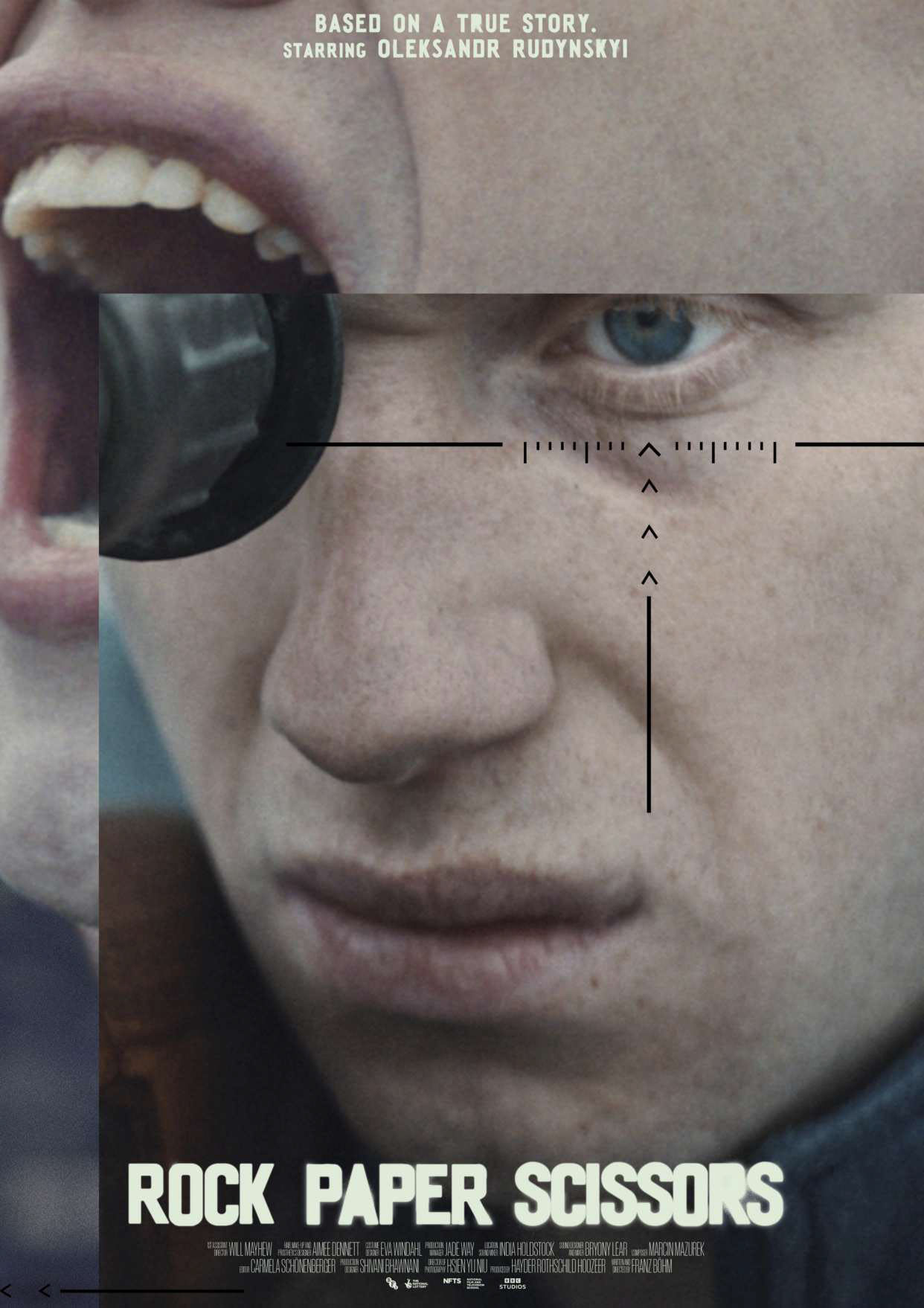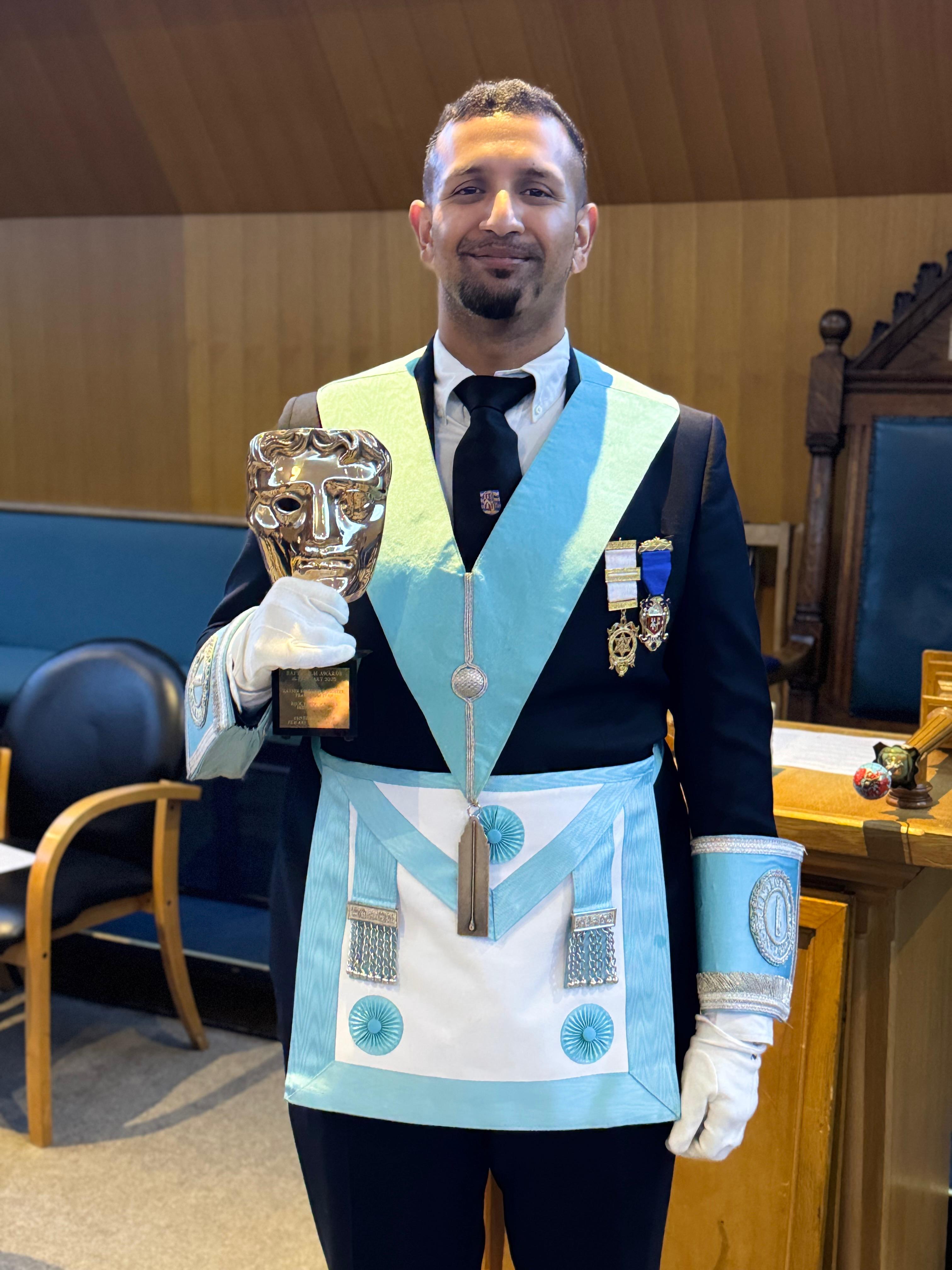Bro Hayder Hoozeer is a film producer and alumnus of the National Film and Television School. He is also a proud Freemason and, now, possibly even prouder BAFTA winner…

How did the film “Rock Paper Scissors” come about?
“I first met Franz, the director, in 2023 through our shared production manager. From the moment I saw his work, I knew he was someone special—his talent and relentless work ethic stood out immediately. We clicked straight away, and I knew I wanted to collaborate with him.
This film is a short—Franz’s graduation project from the National Film and Television School (NFTS). As an alumnus myself, it was a full-circle moment when he specifically asked me to come back and produce it. That personal request made it even more meaningful for me.
At its core, the film explores the impact of the war in Ukraine on ordinary people. Franz had a connection with the Royal Navy, and in 2022, he met Ivan—a civilian Ukrainian who had come to the UK for military training. Their friendship became the foundation for this story, capturing what it means to be thrust into the middle of a war.
For me, this wasn’t just another project. I’ve been to Ukraine multiple times, I have close Ukrainian friends, and I deeply understood the weight of telling this story with authenticity. That was paramount.
And the journey has been extraordinary. While we brought in specialists for key roles—like a Special FX consultant and an armourer to handle real weapons on set—the majority of our creative team were NFTS graduates. This was, at its heart, a student film. And yet, here we are, winning a BAFTA for Best British Short Film! That’s the power of great storytelling, a relentless team, and the right vision.”

What’s the path to the BAFTAs like?
“I’ve been working in the industry for about 15 years now, climbing my way up from the very bottom. I started as a runner—making tea, hauling bags, shifting furniture, and driving vans. It was pure graft. Over time, I moved through the production office, working as a coordinator, and eventually found my footing as a producer. I built my career from the ground up, learning every layer of the process along the way.
Right now, producing is all-encompassing for me. It’s about shaping the film from the very beginning—working with the director and writer on creative development—all the way through the nuts and bolts of production, post-production, and ultimately positioning the film for distribution and exhibition. It’s about ensuring the story reaches the right audience in the most impactful way possible.
One of the things I respect most about the BAFTAs is their reputation for integrity. Unlike some other awards, you can’t campaign or ask people to vote for your film. The process is purely about the work being seen, appreciated, and judged on merit. That’s why festival strategy is so important. We were deliberate about which festivals to submit to, focusing on those that would give the film the best exposure. That meant meeting the film community, sparking conversation around the topic of the film, and representing the very people the film is about. It’s a heavy responsibility—one that I am proud to carry for the people of Ukraine.
We worked closely with the Ukrainian community, both in the UK and abroad, to maximise the visibility of the film. The goal was always to raise awareness—showing what it’s truly like to be a civilian caught in the middle of a war. It’s a story of quiet bravery, of real people making impossible choices, and that’s what we wanted to honour. It was never meant to be a Hollywood epic; it was about authenticity, about truth. And I think that’s what resonated with BAFTA, the Academy, and audiences alike.”
With this film, you are crowning a reputation for your stated objective of ‘mining great stories and great people’. What’s next?
“Franz is well into the production of his debut feature fiction film, which focuses on the Uyghur crisis. He’s aiming to shoot either late this year or early next year. It’s an incredibly important story, and I know he’ll bring the same level of depth and integrity to it as he did with “Rock, Paper, Scissors”.
For me, there’s still a long road ahead with “Rock, Paper, Scissors”. Winning the BAFTA means we’ve now officially qualified for the 2026 Oscars. But qualification is just the first step. Now, it’s about making it onto the longlist, then the shortlist, then securing a nomination—and ultimately, the win. Unlike the BAFTAs, the Oscars require a campaign. You have to actively put the film in front of the right people, create momentum, and make sure it stays on the radar. That’s a huge priority for me right now.
The American audience is particularly crucial. We’re making a big push to get the film seen in the U.S. because this story couldn’t be more relevant in today’s world. With such divisive opinions around the matter, it’s important that people can understand the different perspectives of this war so they can make better-informed opinions. From the beginning, I’ve always said that my audience isn’t just Ukraine—it’s every non-Ukrainian. This film exists to provide a perspective on what it means to be a civilian caught in war, to bridge that emotional gap for people who may only be experiencing this conflict through headlines. Any support in amplifying the film’s reach in the U.S. is invaluable, both for its impact and for the awareness it raises. This isn’t just a film—it’s real life for so many people.
While I’m focused on maximising the exposure of “Rock, Paper, Scissors”, I’m also developing multiple film projects at different stages. I’m actively building collaborations with writers to bring new stories to life. My ethos as a filmmaker is simple: I want to tell stories that resonate with those who feel trapped in their circumstances. I want to create films that offer even a brief escape from the weight of reality—if only for 90 minutes.
For me, growing up wasn’t easy. I had my own share of struggles, but cinema gave me something nothing else could: an escape. It let me be whoever I wanted to be, even if just for a while. It gave me hope when I had none. And now, through my work, I want to give that back.”
Much of what you have said is distinctly Masonic. What’s been your Masonic career?
“I became a Freemason in 2017. Unlike many, I had no family connections to the Craft—no immediate or extended relatives who were Masons. But I always felt drawn to something bigger than myself, something beyond personal ambition. I knew I wanted to be part of a community, to give more than just to my own pursuits. That curiosity led me to take a tour of Grand Lodge, where I spoke to a few Brethren and felt an immediate connection.
At the time, I was living in Ealing, and they put me in touch with what would become my Mother Lodge—Brentford No 2400, which meets at the West London Masonic Centre. I spent two years attending Lodge of Instruction every Monday night—not even in the room, just sitting outside—before heading for drinks with the Brethren afterward. If that sounds like a long commitment, trust me, it was. But the value it’s brought to my life has been immense.
Growing up, I didn’t have many male role models. My dad passed away when I was young, and I never really had that guiding presence. So finding camaraderie with people outside my age group, learning from their experiences, and sharing in that brotherhood was something I didn’t realise I needed.
One of the films I’m currently developing is deeply inspired by this—exploring how friendships can form in the most unexpected places. Sometimes, the closest bonds are with people 40 years older than us, whether through work, community, or just being neighbours. That’s exactly what Freemasonry has given me—friendships that span generations, shared wisdom, and a brilliant sense of humour that ties us all together.
It took two years before I finally secured a Proposer and Seconder, but in 2017, I was Initiated and progressed through my Degrees over the next few years. It was everything I had been looking for.
Of course, COVID put everything on pause for a while, but today, our Lodge is thriving, with plenty of new candidates bringing fresh energy into the fold. Now, as Junior Warden, I’m focused on making my way up through the Chair—and the journey is just getting started.”
A Producer’s job is 24/7 - how do you find time for the Craft?
“Freemasonry aligns deeply with my values and morals. Like I’ve said before, I’ve always wanted to be part of something bigger than myself—something meaningful. Being a Mason gives me that sense of purpose, a feeling that I’m contributing to something greater. It reflects what I believe in at my core.
Brentford Lodge No 2400 takes immense pride in its ritual work. There’s a real discipline in how we approach it, and to me, that speaks to strong values—commitment, precision, and respect for tradition. I also deeply appreciate the focus on charity. The ethos of helping others isn’t just a principle; it’s a way of life. That’s something I personally resonate with.
There are actually huge parallels between filmmaking and Freemasonry. On set, just like in the Lodge, there’s a structure—a hierarchy that makes everything function seamlessly. There’s integrity, trust, and respect, which are essential when working as a team. And then there’s the camaraderie, the shared sense of purpose, the collective effort to create something greater than ourselves. You could even argue that filmmaking has its own kind of ritual—the way we communicate, the processes we follow, the discipline in how we bring stories to life.
I’m incredibly proud to be a Freemason. It’s a remarkable Fraternity, and it has enriched my life in ways I never expected.

This article is part of the Arena Magazine, Issue 57 Spring 2025 edition.
Arena Magazine is the official magazine of the London Freemasons - Metropolitan Grand Lodge and Metropolitan Grand Chapter of London.
Read more articles in the Arena Issue 57 here.